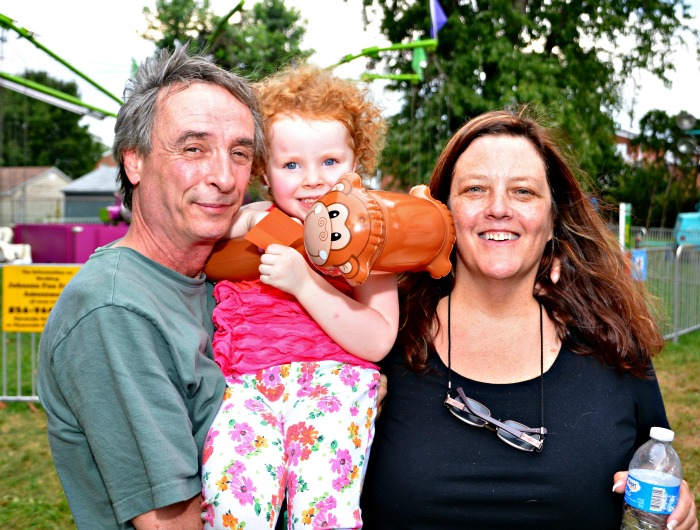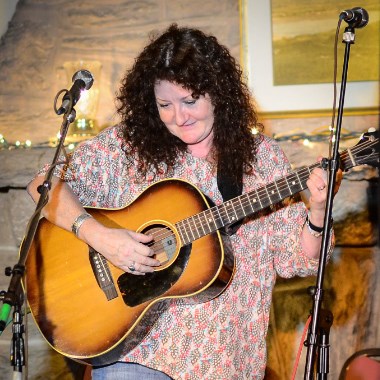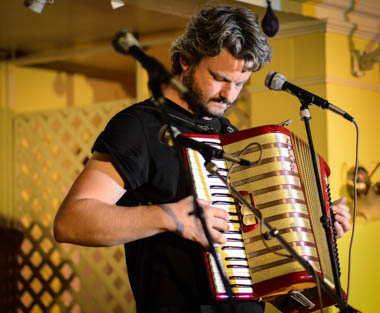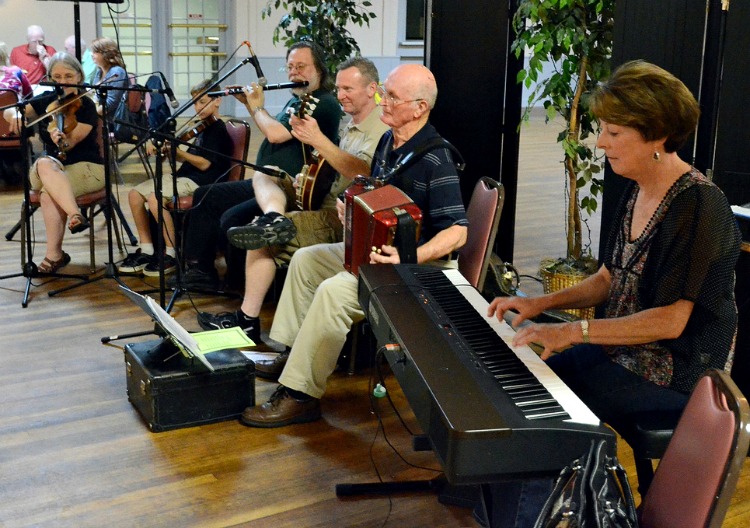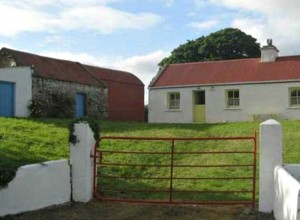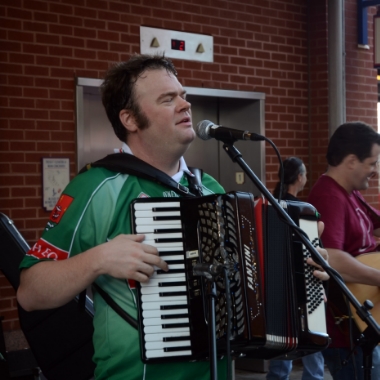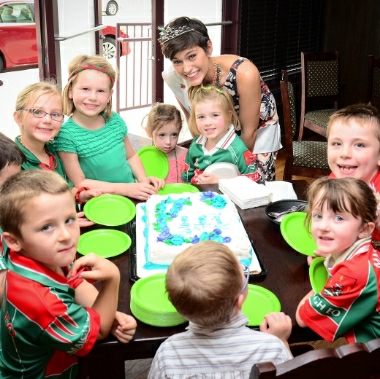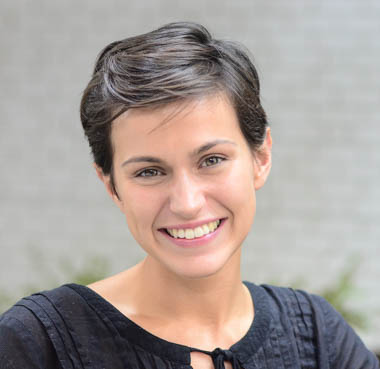
Maria Walsh of Philadelphia, 2014 International Rose of Tralee
Here are a few things you probably don’t know about the new International Rose of Tralee, Maria Walsh, the first Rose from Philadelphia:
After emigrating with her family from Boston to Shrule, County Mayo at the age of seven, she grew up dreaming of becoming the Rose of Tralee, though she never thought it would happen, up until the second, while standing on the stage at The Dome in Tralee, she heard announcer Daithi O’Se say the word, “Philadelphia” after an interminably long drum roll. The Irish bookies had her pegged the winner from the start, but even her family didn’t bet on her.
She once appeared in an Irish reality show in which 40 people were vying for position on an Irish football team. “I was second to the last to get kicked off but then I tore my groin muscle and couldn’t play. I had an Oscar worthy moment when I cried on national TV–and I don’t cry,” confesses the 27-year-old who combines delicate Audrey Hepburn good looks with a wicked Irish sense of humor.
Her ease and naturalness in any situation may have played a large part in winning her the Rose of Tralee crown, but it worried her handlers—and her—just a bit. Her language can be, well, salty. “Before I went out on stage they told me, ‘Don’t swear, and talk slower,’” she recalled this week, sitting, crownless (though she volunteered to go get it) in the atrium near her office at the fashion house Anthropologie, where she’s the studio manager, in Philadelphia’s Navy Yard. No F-bombs were dropped, to everyone’s relief, including hers. As she came off the stage, she said teasingly, “‘Did I swear?” and they said no, and I said, ‘grand!’” She laughs.
The Rose isn’t the only honor she’s won that brought her fame. In 2005, she was named “Hostess of the Year” for Ireland’s No Name Club, an organization founded in 1978 for young people 15 and older who want a nonalcoholic alternative to pub culture to meet and socialize. Since the age of 12, Walsh has been part of the Pioneers, a Catholic organization whose members take a pledge not to drink.
She tans. She credits her mother’s Connemara roots. One of four children of Vincent and Noreen Walsh (who, like her daughter, was born in the US but grew up in Ireland), she shares her dark, Black Irish skin with her mother and youngest brother, while their two other siblings inherited red hair and freckles. “They’re the typical white Irish people,” she says laughing.
She once wanted to become a nurse “so that I could help people.”
One of the Rose commitments she’s looking forward to the most is spending a week in Calcutta with the Hope Foundation, an Irish charity that provides shelter, education and medical aid to the city’s poorest children—the homeless. She’ll also be going to Chernobyl with her fellow Roses and escorts to work for a week with abandoned and orphaned children, most of whom have mental and physical disabilities.
No, it’s not just the Miss America Pageant with an Irish accent, and Maria Walsh is no ordinary pageant winner. She’s a funny, confident, gutsy woman who plays Gaelic football, loves banter, doesn’t pass up a chance to do volunteer work (“I still get roped into collecting at the church gate for some charity when I go home,” she says), and, until she fell in love with a woman two years ago, never really thought much about being gay. “I dated boys up right up until that, but this was the first time that I found someone I was willing to work my life around,” she says simply. (She’s still close to her now ex, who lives in Ireland.)
She still doesn’t think much about it—much like her Philly supporters–and probably wouldn’t talk about it except that after her win, she got a phone call from a reporter the Irish Sun newspaper who said she wanted to talk to Walsh about “your sexual orientation.”
She still doesn’t know how the reporter found out, though she’s not particularly secretive about it. “Maybe they found something on social media sites—I don’t know,” she says. She hadn’t discussed it with anyone in the Rose organization because “it just never came up, nor should it. I identify with a lot of things, with Pioneers, with volunteer work. . .what am I supposed to say? ‘Oh, by the way, I’m gay?’ It was not a thing for me. Why should it be?”
The Rose organization didn’t blink either. “They don’t get nearly enough credit for being ahead of their time,” Walsh says. In recent years, the 55-year-old Rose of Tralee Festival has increasingly been called “irrelevant” by social commentators, though, after this year’s event, the critics may backpedal on that one. The Rose organizers gave her the go-ahead to talk to the reporter and, ultimately, she was happy with the article and the subsequent mini-storm of stories that followed.
“My biggest concern was this would become a negative issue for the Rose of Tralee organization or the Philly Rose Center. But there was a very positive response. Basically, what people have been saying is “what a great ambassador for the Rose, fair play to her,’” Walsh says.
Her parents already knew and although her Dad has expressed some trepidation for her, they were more than accepting. “My Dad said he was worried about my future, how this would affect my career, whether I’d be able to get married, how I might be hurt because of how I chose to live. He said, ‘You’re choosing a hard life, Maria,’ and I said, I’m choosing my life.”
She wasn’t worried about their reaction. Maria Walsh is her parents’ daughter. Her mother was her Pioneer role model, and both parents are heavily involved in community work. Her father helped expand the town’s community center at largely his own expense when grants fell through; her mother is the chairperson of the local ladies club (“so I got roped into tea mornings all the time,” Walsh says laughing).
Volunteer work may be in the Walsh genome, but she also credits her upbringing for giving her confidence to strike out on her own path from early on, whether it was eschewing alcohol, moving to the States for work, or falling in love with a woman. “I grew up in a great family atmosphere,” says Walsh. “If I wanted to do something, my parents would never say, no you can’t do that. It would be ‘what time?’ and ‘where?’ and they’d be there. They’ve always supported what’s best for me.”
The sudden death of her cousin Teresa in a car accident several years ago brought profound sadness—she was only 19—but has since become a source of strength. In her cousin’s honor, Walsh had three little ladybugs—what the Irish call ladybirds, and something her cousin loved—tattooed behind her ear. And not long after, with some friends, she went to Eddie’s Tattoo on Fourth Street to have the words, “The trouble is—you think you have time” tattooed on her forearm. It reminds her, she says, to carpe diem, to seize the day.
“It’s because of Teresa,” she says. “It’s often difficult to find the time for everything, for work, friendship, love. You’re always saying, oh, I’ll do it tomorrow. I even say it, even though I have this to remind me. The truth is, you don’t always have tomorrow and that can help make big decisions easier to make. That’s why I entered the Rose of Tralee. It’s why I try to make the most out of every day.”
And to make the most out of the opportunities that come her way. She wasn’t, she admits, thinking that she might become a strong role model for other young women like her when she sat down with a reporter to talk about her sexuality. But it’s what’s happened. “There are a lot of young people out there who are struggling with their identity. I’ve gotten a lot of letters and I just got one recently from a young woman who thanked me for coming out publically because it made it a lot easier for her parents to understand her,” she says.
As she told the RTE’s Ryan Tubridy, host of “The Late Late Show” last week: “If I could help one young person come out and deal with it in a positive way, then my year as the Rose of Tralee will already have been completed.”
But she hopes she’s a role model in other ways too, and that also appears to be happening. Case in point: She was on the plane on the way home from Ireland last Sunday after appearing on the “Late, Late Show,” when a little Irish girl came up to her and asked her if she was the Rose of Tralee. “She said, ‘Can I have a photo with you?’ I said, ‘ yes, give me a couple of seconds, where are you sitting?’ So I got my crown and sash and went to where she was sitting. She was literally shaking with excitement. I gave her my crown and my sash to put on. And I asked her, ‘So, do you want to be the Rose of Tralee when you grow up?’ And she said, ‘Oh yes, now that I’ve met you.’”
Walsh smiles. Mission accomplished: One childhood dream realized, and successfully passed along to someone else’s childhood.

